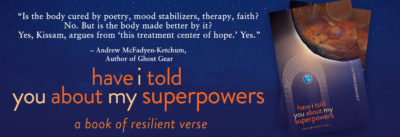
(8-8-22) In this third installment about recent books, emerging author Luther Kissam V finds power and healing writing poetry. Thrilled to reprint his story and a poem.
Have I Told You About My Superpowers
by Luther Kissam V (copyrighted material used with author’s permission.)
It was about 10 p.m. at my rural, Pennsylvanian boarding school when my mother found me running nearly naked through the snow and freezing weather. She was visiting, and I had just jumped out of her moving car, paranoid that she was trying to stop me from fulfilling my purpose.
I told her I had superpowers that the moon had given me, and that I was on fire. Neither of those things were true, but my delusions of grandeur were overwhelming. I was manic with psychotic features. Serendipitously, a teacher stumbled upon us, and was able to coax me into his car before taking me to the school infirmary so I could be hospitalized.
I left the hospital with a diagnosis of bipolar disorder, and a prescription for Lamictal. In some ways being diagnosed with bipolar disorder was a blessing; at least I finally knew the cause of my worsening emotional instability. For years I rapidly cycled through episodes of depression and mania, impacting my relationships and potential future.
I was getting by but barely.
One of the few bright spots in my life was writing, poetry in particular. Increased creativity can often be a symptom of elevated mood, and whenever I began to slip into hypomania, I would write and write and write, drafting entire books in a few days. With diligent practice and a willingness to receive feedback, I developed my craft. I often struggled with the idea that my meds stifled my creativity and, for a while, resented taking them for that reason. Not taking my meds, of course, led to more episodes.
Eventually, my mental health was in such terrible condition that my life became unlivable. I survived multiple suicide attempts, but it seemed another was inevitable. I tried electroconvulsive therapy to varying degrees of effectiveness. I left college on two separate occasions to manage my bipolar disorder, but nothing I tried seemed to work. I just couldn’t remain stable.
In June of 2021, I began to finally see positive results of my efforts. I entered a residential treatment center, the Lindner Center of Hope, and truly worked harder than ever to manage my moods. Because of my time there, I remain compliant with my medicines. I go to bed at a reasonable hour, and I utilize my coping skills. I’m also a much happier and healthier person.
It’s no coincidence that I also take my writing more seriously, often using it to tell stories from my lived experience with bipolar disorder. Most recently, I took creative ideas birthed from places of instability and carefully shaped them into a collection of poems. I hoped to help readers experience the tumultuous thoughts and actions of a symptomatic bipolar person, while offering a relatable message of hope and resiliency. I submitted my collection to a number of different publishers, and an indie press picked it up for publication.
Below is a poem from Have I Told You About My Superpowers. This poem is the story of many conversations I had with my psychiatrist at Lindner and my journey towards acceptance. I hope you’ll enjoy it.
Walk softly please,
Luther Kissam V
Poem in Which I Learn How Inosculation Feels
My psychiatrist is a kind woman, but no one
would mistake her for gentle. It’s why I respect
her and her long, broad nose that fights
the mask the clinical directors make her wear.
I even like her despite the words she uses,
like a hammer, to smash the stories I’ve told
myself into a million fragments that I can
never piece back together. She makes me promise
I won’t try. She begins in her Latino accent,
“People like you, and there are many happy,
successful people like you, need to take two mood
stabilizers and sometimes, like in your case, an extra
antipsychotic to help manage the mania. We use
Lamictal and therapy to treat the depression,
and the longer you stay stable, the more resilient
you’ll be when an episode comes around.”
She pauses. I brace for the hammer.
“You’re also not as stable as you can be.
We’re keeping you here in residential, increasing
the doses on your medications.”
Her words are too much to process at once. I see
her hand push a pen across her prescription pad.
Her handwriting is elegant for a doctor. Her words
are a blunt instrument. There is nothing surgical
about psychiatry. I am afraid of the answer, but I still ask,
“How long will I need to take medications?”
“Forever.”
I look out her window to avert my eyes
from her pad and nose and black hair
and medical books that are in English
and Spanish and past the resident
physician that joins our meetings.
My eyes catch two trees. They are joined
in the middle. Fused together in a memory
of when they first met. Still, they climb,
reach, touch the sky. My psychiatrist
catches my eyes wandering.
“In forestry, they call that inosculation.
The trees are colloquially known as gemels.”
I wonder if she knows everything else
there is to know—Mandarin, how to bake
a cheesecake without cracking the crust,
and the secret to a happy marriage—considering
the authority she always speaks with. It angers
me. I feel powerless. Then I realize I know
something she cannot learn—how the gemels feel.
I laugh, tell her,
“Thank you.”
To read more of Have I Told You About My Superpowers click here and visit Luther’s website.
ABOUT THE AUTHOR: Luther Kissam V studies English and creative writing at the University of North Carolina at Charlotte. He is the author of Have I Told You About My Superpowers, a collection of poems about bipolar disorder. He is working on his first novel.




